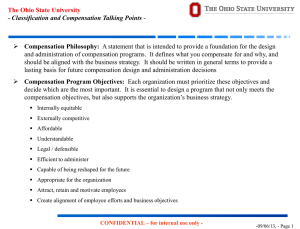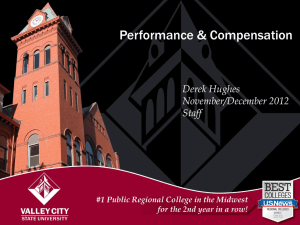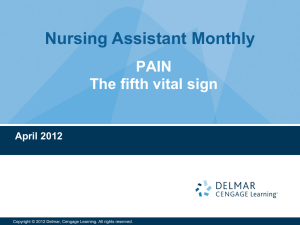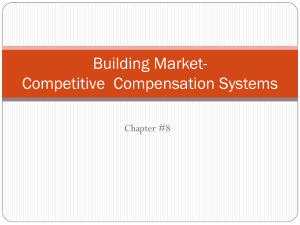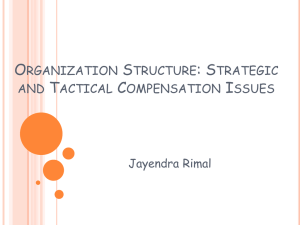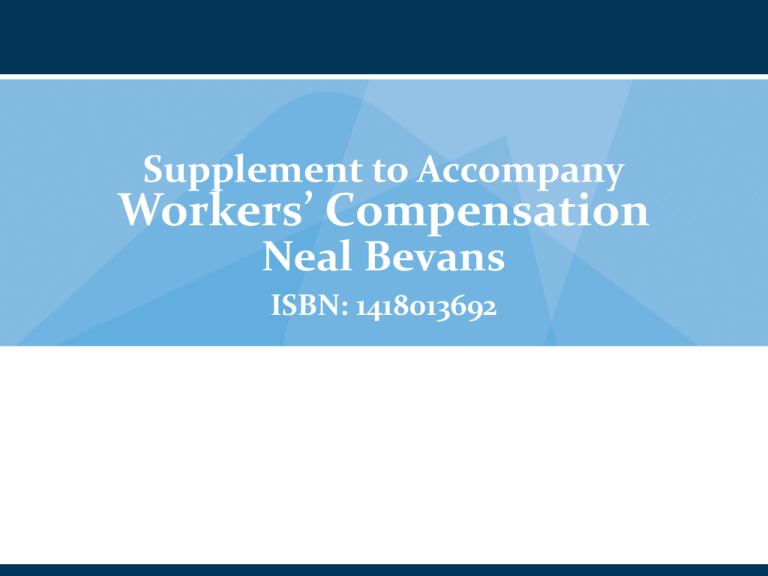
Supplement to Accompany
Workers’ Compensation
Neal Bevans
ISBN: 1418013692
CHAPTER 1
Introduction to Workers’ Compensation
What Is Workers’ Compensation?
Workers’ Compensation is a form of
insurance that guarantees compensation to
injured workers, both for medical expenses,
rehabilitation, and weekly wages until the
employee has recovered sufficiently to return
to work.
3
© 2009 Delmar | Cengage Learning. All rights reserved.
The Basic Premise of Workers’ Compensation
The basic premise behind workers’
compensation is that an injured worker will
receive a specified monetary award for a
particular injury. Under workers’
compensation, employees and employers do
not have to waste time and resources
pursuing personal injury actions.
4
© 2009 Delmar | Cengage Learning. All rights reserved.
A Short History of Workers’ Compensation
Workers’ Compensation movements began in
the early part of the twentieth century.
Prior to the enactment of workers’
compensation statutes, the law took a harsh
view of employee injuries.
5
© 2009 Delmar | Cengage Learning. All rights reserved.
A Short History of Workers’ Compensation
Employers could raise defenses to injured
workers’ claims
Assumption of the risk
Negligence of the employee
Intentional actions by third parties
6
© 2009 Delmar | Cengage Learning. All rights reserved.
Exclusiveness of Remedy
The workers’ compensation system is usually
the only forum through which the parties can
work out their differences.
Injured workers must bring their claims
through the workers’ compensation system or
not at all.
7
© 2009 Delmar | Cengage Learning. All rights reserved.
Do Workers’ Compensation Statutes Violate
the U.S. Constitution?
If a statute requires employees to submit their
claims to the Workers’ Compensation Board
and bars them from bringing civil suits, is
that an unconstitutional infringement of a
citizen’s rights?
Courts have consistently answered that it is
not.
8
© 2009 Delmar | Cengage Learning. All rights reserved.
Determining Who Is Covered by Workers’
Compensation Statutes
It is important to determine who is and who
is not covered under Workers’ Compensation
statutes.
Covered employees are entitled to benefits.
Employees who are not covered are not
entitled to benefits.
9
© 2009 Delmar | Cengage Learning. All rights reserved.
Who Is Covered Under Workers’
Compensation?
Employees who are employed by for-profit businesses
Employees who work for counties and towns and work in
“hazardous” areas
Most public school teachers, with some important
exceptions
Employees who work 40 or more hours per week
Seasonal or agricultural workers who earn $1200 or more
Any other employee deemed covered by the State Board of
Workers’ Compensation
10
© 2009 Delmar | Cengage Learning. All rights reserved.
Persons Who Are Not Covered Under Workers’
Compensation
Members of the clergy
Teachers at religious institutions
Members of the merchant marines and other sea-going professions
Railroad workers
Federal employees
Casual laborers
Employees of foreign governments
Sole proprietors and other small business owners
11
© 2009 Delmar | Cengage Learning. All rights reserved.
Workers’ Compensation Benefits
Workers’ compensation benefits include:
– Medical expenses
– Income during the injury/illness
– Death benefits
– Burial benefits
12
© 2009 Delmar | Cengage Learning. All rights reserved.
Medical Expenses
The medical expense benefit provided
under Workers’ Compensation pays the total
cost of the medical bills that flow from
treating the injury/illness.
13
© 2009 Delmar | Cengage Learning. All rights reserved.
Income During Injury/Illness
Workers’ compensation also provides for
payments to an injured employee during the
period that he or she is unable to work
because of a work-related injury/illness.
These payments are usually a percentage of
the employee’s total income.
14
© 2009 Delmar | Cengage Learning. All rights reserved.
Death Benefits
Death benefits under workers’
compensation pay family members for some
of the income lost because of an employee’s
death.
Only certain family members are qualified to
receive death benefits, such as dependent
children and spouses.
15
© 2009 Delmar | Cengage Learning. All rights reserved.
Burial Benefits
Many states provide a maximum $6,000
benefit for an employee’s funeral expenses
under the burial benefit provisions of a
workers’ compensation insurance plan.
16
© 2009 Delmar | Cengage Learning. All rights reserved.
Determining the Amount of Benefits
One of the responsibilities of the state Board
of Workers’ Compensation is to determine
the extent of the employee’s injuries.
17
© 2009 Delmar | Cengage Learning. All rights reserved.
Special Protections for Firefighters and
Law Enforcement Officers
Firemen and law enforcement officers often
have a specific statutory protection when it
comes to defining “accident” or “injury.”
In these cases, a statute will require an
administrative law judge or Workers’
Compensation Appeals Board to presume
that any heart or lung disease is caused by
working conditions. Most other employees do
not receive this special legal presumption.
18
© 2009 Delmar | Cengage Learning. All rights reserved.
Denying Benefits for Claims of Fraud
All of the benefits discussed so far can be
denied in cases where an employee engages in
fraud.
There are numerous kinds of fraud, from
employee fraud to medical billing fraud.
19
© 2009 Delmar | Cengage Learning. All rights reserved.


